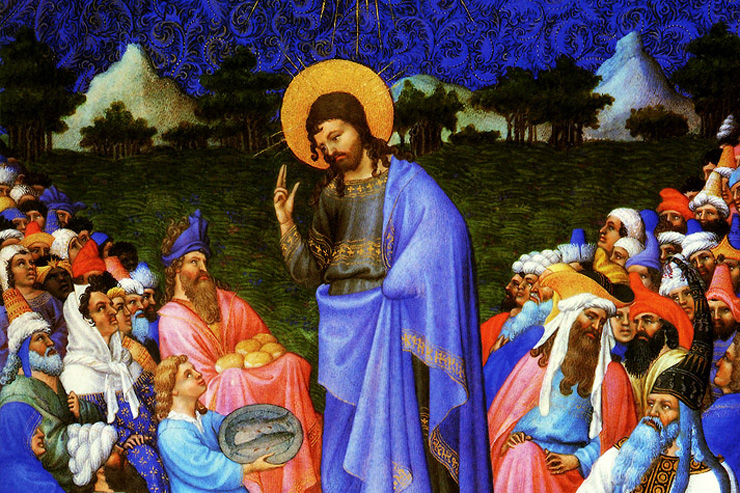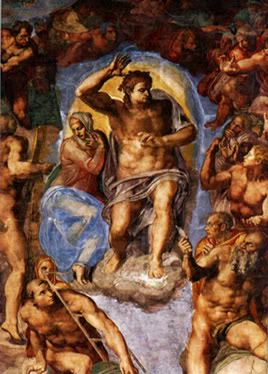Our bookstores are filled with books written to help us advance in prayer and the spiritual life. The “secret” we all look for is really no secret at all. At its heart, the gospel message is one of self-denial and detachment from all things that are obstacles to our growth. Jesus tells us that if we are to be his disciples, we must deny ourselves, take up our crosses and follow him (cf. Matthew 16:24). That is why Catholics practice fast and abstinence as a form of self-denial intended to lead us to perfection. So stick with me here and learn how self-denial will satisfy your deepest hunger.
So with Lent upon us, let’s take a closer look at this important teaching of the faith.
The Catholic Disciplinary Laws of Fast and Abstinence
In these modern times, we don’t seem to hear much about fasting and abstinence anymore. That’s a shame because the doctrine of self-denial is crucial to our becoming fully satisfied. Many of today’s Catholics associate fasting and abstinence only with the season of Lent and that’s a shame too. Let’s review the Church’s disciplinary law regarding Fasting and Abstinence:
- Fasting During Lent — The Church requires its members to fast on two days each year — Ash Wednesday and Good Friday. The Bishops in the United States have defined the minimum requirement of the fast for U.S. Catholics to be one full (but not excessive) meal plus other food not to exceed the full meal which may be taken in part at breakfast, noon or evening, depending on when one decides to take the “one full meal”. This law applies to Catholics between the age of 18 and 59.
- Abstinence From Meat on Fridays — The Church requires its members to abstain from eating meat on Fridays as an act of penitence. In the United States, Catholics are permitted to substitute another form of penance on Fridays outside the season of Lent. This law applies to all Catholics who are over the age of 14.
- The Holy Communion Fast — Catholics must also fast for a minimum of one hour before receiving Holy Communion.
The entire season of Lent is a penitential time and our attitude and behavior during this season should be marked by some sort of self-denial. The season of Advent is also a penitential season, but of less severity, and we should also mark this season with some form of self-denial, even if it is less than that practiced during Lent.
That’s it! And so many of us complain and wait for the clock to tick down to midnight so we can have a ham sandwich. We need to turn our thinking around because uncontrolled appetites only become hungrier and more insatiable. That is why there is a myriad of “miracle” diets and weight loss programs on the market that promise results without effort. Well, there is only one source of miracles and that is God. He has already provided us the ultimate diet program if we will but listen to him.
Although we often only hear about fast and abstinence associated with Lent, it is really a practice that is important all through the year.
So Let’s Go a Bit Deeper
As you can see, “to fast” generally means to significantly reduce the consumption of food or to forego it altogether for short durations. Abstinence is generally seen as avoiding the eating of meat. But both acts are forms of self-denial. More broadly speaking, self-denial is the act of giving up something that is good, be it food or some other “good” for the purpose of deepening our spiritual life and making acts of reparation for our sin or the sin of others. There is a long-history of the Catholic practice of fast and abstinence dating all the way back to the time of Christ. Our culture often incorporates these practices into our everyday language. For example, the word breakfast is formed from two words, “break” and “fast” meaning simply that the first meal of the day breaks the fast from our last meal of the previous day. Another example, although this has nothing to do with fasting, is our word for the celebration of Christ’s birth which is formed by two words, “Christ’s” and “Mass” or Christmas.
Why? How Do Acts of Self-denial Strengthen Our Spiritual Life? What’s the Connection?
The Church speaks of the three pillars of Lent—Prayer, Fasting and Almsgiving—because there is a strong connection, or there should be, between the three. Fasting and other forms of self-denial, as spiritual practices of materially subduing and controlling the physical appetites of the body, helps us, by God’s grace, to enable the soul to more perfectly and freely pray. This leads to a deeper union with God and thus we become better stewards of the gifts God has given to us, freeing us to more effectively care for our neighbor, especially those in greater need than we. When I was a small boy, my mother would encourage me (it’s probably more accurate to say she required me) during Lent to give up things I would normally buy with my allowance. The money I saved could and would be used to assist those less fortunate we were.
God gave our first parents, Adam and Eve many gifts and blessings that were in a sense before their nature and, therefore, before our’s too. We know that Adam and Eve possessed Sanctifying Grace, infused with the supernatural virtues of faith, hope and charity. This is what is meant when you hear the phrase, “Adam and Eve were created in a state of original justice.” They were created for a supernatural end or purpose… to attain heaven and an everlasting communion with God. They were also given certain gifts, called preternatural gifts, that would enable them to continue their “walk with God”—(1) bodily immortality, (2) integrity, and (3) infused knowledge.
But they were also allowed by God to be tempted by the devil, not so that they would sin, but so that they could freely choose to love God who created them freely and in freedom. Their free will would not have been free at all if there was never an opportunity for them to choose anything other than the Good which is God. If they had chosen God over the serpent, these gifts would have been passed on to us an our inheritance, but we know they sinned and lost these gifts, therefore, we, their descendants, could not receive what they no longer possessed to pass on.
How Detachment is Connected to the Loss of the Gift of Integrity
To understand what all of this has to do with our practice of self-denial, we have to understand what we lost when we lost the preternatural gift of integrity. Do you ever feel like you just cannot do what you want, or rather know you should want to do, but instead find yourself doing that which you do not want to do? St. Paul speaks of this in his Epistle to the Romans, “We know that the law is spiritual; but I am carnal, sold into slavery to sin. What I do, I do not understand. For I do not do what I want, but I do what I hate” (Romans 7:14-15). Each of us can relate to St. Paul’s words.
The Church teaches that one of the effects on us of the Fall of Adam and Eve is that we suffer from concupiscence—the inclination of man to sin. There are two types of concupiscence. In simple terms they are: bodily concupiscence and concupiscence of the soul. Bodily concupiscence is the tendency of our will to choose to indiscriminately satisfy bodily appetites, to choose things which appear to bring pleasure, even if reason would tell us not to. Concupiscence of the soul is an unreasonable self-absorption that disregards right and wrong in apparent favor of self.
So, how does voluntary self-denial help us fight concupiscence?
Integrity helped us make acts of will in our freedom that were reasonable and sound in governing the appetites of the body and lower reaches of the soul. Integrity helped us balance body and soul to our good. In our fallen state, even once redeemed, practicing the virtues, particularly moderation (the virtue of temperance), helps us to replace bad habits with good habits (replace vices with virtues). Going further, voluntarily denying the body even good things is a form of spiritual training for that same end, much like a musician becomes a better musician by giving up good things in order to practice his instrument or like an athlete giving up food and time in order to train his body to excel and endure under physical and mental strain. This is pure Gospel teaching, the giving up of those things, including good things, that tend to be obstacles to our sanctification and deepening relationship with the Lord… giving up things that hinder and obstruct our supernatural end; life everlasting in heaven. We can become so attached to even the beauty of the world God created that these attachments become our “gods.” And this is where Fasting and Abstinence in their broader meaning help us to become truly and fully satisfied. For God alone, not the things of this world, can satisfy the deepest hunger of man’s soul.
~ ~ ~ ~ ~
A recent article looked more deeply at the significance of self-denial. Many of us have friends and family that are not Catholics who simply do not understand how we Catholics can think that giving up good things will help us attain heaven. In fact, some non-Catholic Christians view the Catholic form of self-denial as a rejection of the free gift of salvation. So check it out for extensive biblical support and explanations for why these are not only good practices, but necessary ones.
Into the deep…
Deacon Bickerstaff is available to speak at your parish or event. Be sure to check out his Speaker Page to learn more. Into the Deep is a regular feature of the The Integrated Catholic Life™.
Come and Join me on Twitter!














